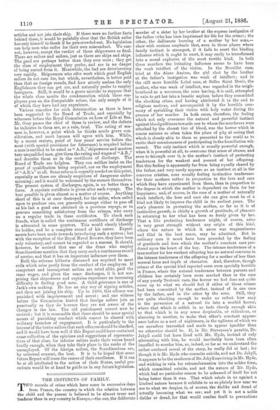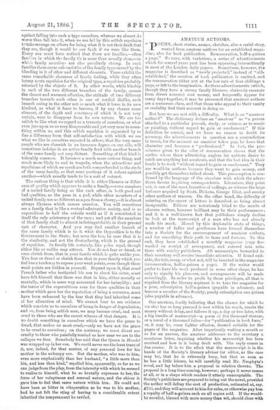THE INSTINCTS OF FAMILY.
TWO records of crime which have come in successive days from France, the country in which the relation between the child and the parent is believed to be almost truer and 'tenderer than in any country in Europe,—the one, the deliberate murder of a sister by her brother at the express instigation of the father (who has been imprisoned for life for the crime); the other, the deliberate burning of a mother by her sons,— show with curious emphasis that, even in those places where family instinct is strongest, if it fails to exert the binding influence which it ought to exert, it may easily be transformed into a moral explosive of the most terrific kind. In both these murders the irritating influence seems to have been the weak intellect of the victim. In the Bronillet case, tried at the Aisne Assizes, the girl shot by the brother at the father's instigation was weak of intellect ; and in the still more horrible Leboi case, at Selles Saint Denis, the mother, who was weak of intellect, was regarded in the neigh- bourhood as a sorceress, the sons having, it is said, attempted in vain to get her into a lunatic asylum before they committed the shocking crime, and having attributed it in the end to religions motives, and accompanied it by the horrible cere- mony of sprinkling their victim with holy water during the process of her murder. In both cases, therefore, the feeling which not only overcame the natural and powerful instinct against bloodguiltiness towards one to whom the murderers were attached by the closest ties of blood, was the horror which in coarse natures so often takes the place of pity at seeing that which is closely akin to them so presented to the world as to excite their consciousness of participating in the humiliation wit- nessed. The only instinct which is usually powerful enough, when it is powerful at all, to overcome that sense of shame, and even to triumph over it, is the mother's instinct of protecting tenderness for the weakest and poorest of her offspring. But this feeling is apparently far from being equally shared by the father, and very rarely appears as an instinct at all in the converse relation, sons usually feeling instinctive tenderness for their mothers rather in proportion to the love and care which they have experienced from them, than in proportion to the degree in which the mother is dependent on them for her happiness ; and, of course, in the case of a mother of naturally weak intellect, the love and care she can give must be of a kind not likely to impress the child in its earliest years. The son's pleasure in protecting the mother, so far as it is of instinctive growth, is chiefly a growth of gratitude, of pleasure in returning to her what has been so freely given by her. That a like protecting tenderness might, of course, arise in very great strength without any origin of this kind, where the nature in which it arose was magnanimous and filial in the best sense, may be admitted. But in ordinary men it must have been preceded by the feeling of gratitude and love which the mother's constant care pro- duced upon the heart of the boy. The intense tenderness of a true mother for her weakest offspring has no natural converse in the intense tenderness of the offspring for a mother of less than normal force and depth of character. And, therefore, though 'crimes of the special kind reported seem even specially horrible in France, where the natural tenderness between parents and children has certainly been more marked than in the case of any purely Teutonic race, the horror we feel does not quite come up to what we should feel if either of those crimes had been committed by the mother, instead of in one case by the father, and in the other by the sons. Still, they are quite shocking enough to make us reflect how easy is the perversion of a natural tie into a morbid horror, where that which is selfish in us feels closely enough akin to that which is in any sense despicable, or ridiculous, or alarming in another, to make that other's constant appear- ance before us a sort of nightmare, in the ugliness of which we see ourselves travestied and made to appear ignobler than we otherwise should be. If, in Mr. Stevenson's parable, Dr. Jekyll could but have lived with Mr. Hyde, instead of only alternating with him, he would inevitably have been often impelled to murder him, as, indeed, so far as we understand the rather confused moral of the story, he really did at last ; for though it is Mr. Hyde who commits suicide, and not Dr. Jekyll, it appears to be the modicum of Dr. Jekyll surviving in Mr. Hyde, and wishing in vain for retransformation into the nobler form, which committed suicide, and not the nature of Mr. Hyde, which had no particular reason to be ashamed of itself for not being better than it was. That which rebels in us against a kindred nature because it exhibits to us so plainly how near we are to what we despise, is, of course, the dislike and dread of actually becoming what we see; and yet it is not a noble dislike or dread, for that would confine itself to precautions against falling into such a type ourselves, whereas we almost do worse than fall into it, when we are lel by this selfish repulsion to take revenge on others for being what it is not their fault that they are, though it would be our fault if we were like them. Every one must have noticed that there are families,—often families in which the family tie is more than usually close, —in which family aversions are also peculiarly strong. In such families there occur sub-varieties of the family type caused by the blending in it of other and different elements. These exhibit the same remarkable closeness of family feeling, while they often betray acute repulsion for the original type, a repulsion probably returned by the objects of it. In other words, while kinship in each of the two different branches of the family, causes the closest and warmest affection, the attitude of two different branches towards each other is one of cordial dislike, each branch seeing in the other not so much what it loves in its own kindred, as what it fears to become, if by any chance some element, of the depth and constancy of which it is not very certain, were to disappear from its own nature. We are too selfish to like what we regard as a travesty of ourselves, or what even jars upon us as very disagreeable and yet very near to some- thing within us, and this selfish repulsion is separated by so fine a difference from that self-satisfaction with which we see what we like in ourselves repeated in others, that the very same people who are clannish in an immense degree on one side, will sometimes indulge in an active family feud with another branch of the same family not very distant. Something of that kind is tolerably common. It becomes a much more serious thing, and much more likely to end in tragedy, when the attractions and repulsions of which we speak are both comprehended in the circle of the same family, so that some portions of it cohere against another—which usually tends to be a sort of outcast.
The curious thing is that while it is either likeness or differ- ence of quality which appears to unite a family,—some members of a united family being as like each other, in both good and bad qualities, as the peas in a pod, while other members of a united family are as different as a pea from a cherry,—it is almost always likeness which causes aversion. You will sometimes see a family that is like a mutual-admiration society, and is as supercilious to half the outside world as if it constituted in itself the only aristocracy of the race ; and vet all the members of that family shall be almost indistinguishable in their general cast of character. And you may find another branch of the same family which is to it what the Opposition is to the Government in the State; but none the less, be sure that it is the similarity, and not the dissimilarity, which is the ground of repulsion. In family life certainly, like poles repel, though either like or unlike may attract. You do not fear or dread, or even shrink from, that in your family which is quite unlike you. You fear or dread or shrink from that in your family which you feel has a tendency to expose your weak points, even though those weak points are hidden in yourself. Depend upon it, that cruel French father who instigated his son to shoot his sister, must have felt himself that there was that in him, either morally or mentally, which in some way accounted for her imbecility ; and the terror of the superstitious sons for those qualities in their
• mother which gave her the reputation of being a sorceress, must have been enhanced by the fear that they had inherited some of her alienation of mind. We cannot bear to see evidence which convicts us to ourselves of being in danger of degradation, and so, from being selfish men, we may become cruel, and most cruel to those who are the surest witness of that danger. It is no doubt something in ourselves which we have the grace to dread, that makes us most crnel,—only we have not the grace to be cruel to ourselves ; on the contrary, we must divert our cruelty to those who painfully remind us how near we are to the collapse we fear. Somebody has said that the Queen in Hamlet was wrapped up in her son. We could never see the least trace of it, nor, indeed, for that matter, of any personal love for his mother in the unhappy son. Bat the mother, who was to him, even more emphatically than her husband, "a little more than kin, and less than kind," repelled him, apparently, so far as we can judge from the play, from the intensity with which he seemed to realise to himself, what he so brutally expresses to her, the force of her voluptuous and sensual nature, and the shiver it gave him to feel that same nature within him. He could not have been as bitter in vituperation as he was to his mother, had he not felt the sting of having to a considerable extent inherited the temperament he reviled.



































 Previous page
Previous page